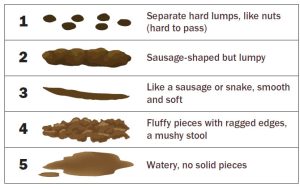This post is also available in:
 Français (French)
Français (French)  Español (Spanish)
Español (Spanish)
What is chronic diarrhea?
Diarrhea is any increase in stooling frequency and/or water content (consistency) that differs from a child’s baseline.
- Acute diarrhea is diarrhea lasting less than 2 weeks and is typically caused by viral infections.
- Chronic diarrhea is diarrhea lasting more than 4 weeks.
How do I know if my child has diarrhea?
Talk with your child’s doctor. The Bristol Stool Chart is a chart that describes different stool consistencies. It is frequently used to help doctors and patients identify stool types. Below is a modified Bristol Stool Chart. Bristol 4-5 stool is typically considered diarrhea.

What causes chronic diarrhea?
There are many causes of chronic diarrhea and different causes can vary based on the child’s age and health status. Chronic diarrhea can happen in previously healthy children or children with chronic medical issues. Most cases of chronic diarrhea in the United States are caused by viruses or side effects of antibiotics and are not severe., so management can be handled at home.
Chronic diarrhea can be broken down into several categories:
- Inflammatory/Infectious causes
- Bacterial, viral, parasitic infection
- Celiac disease
- Inflammatory bowel disease (Crohn’s Disease, Ulcerative Colitis)
- Food poisoning
- Food protein allergies- like cow’s milk protein allergy and food protein-induced enterocolitis (FPIES)
- Malabsorption
- Food intolerances- like lactose intolerance, fructose intolerance, fat malabsorption, protein malabsorption
- Excessive fruit juice intake
- Altered GI tract movement or functional diarrhea.
- Irritable bowel syndrome/Diarrhea
- Toddler’s diarrhea
- Small intestinal bacterial overgrowth
- Medications
- Antibiotics
- Laxatives
- Magnesium
- Chronic constipation
- Can cause leakage of loose stool around hard stool stuck in the rectum.
- Anatomical abnormalities or bowel obstruction
- Congenital diarrhea and enteropathy syndromes- rare
- Children with immunodeficiency or children on immunosuppressant medications
- Children with severe liver disease
How does the doctor determine the cause of my child’s diarrhea?
Since chronic diarrhea can be caused by many different things, your doctor will do a thorough review of your child’s nutritional and growth status and will ask you many questions. Questions to be prepared to answer include:
- What do the stools look like?
- How many episodes of diarrhea per day?
- When did the diarrhea start?
- Did your child have any recent illness, antibiotics, exposure to sick individuals, or recent travel?
- Is there blood or mucus in the stool?
- Does your child wake up to stool at nighttime?
- What other symptoms does your child have (fever, abdominal pain, nausea, vomiting, abdominal distention, rashes, or poor weight gain)?
- What does your child typically have to eat and drink?
- Is your child in daycare or school?
- Is your child vaccinated?
- Is there any family history of GI-related illness?
Your doctor will also perform a physical exam on your child and may recommend hydration support at home and/or initial laboratory testing. These tests can include blood tests, stool tests, or imaging.
Initial laboratory testing evaluates the most common etiologies of chronic diarrhea, looking for signs of infection and inflammation. Testing can also assess the child’s hydration status and nutritional status.
Your doctor may also recommend medication changes.
Based on the child’s history and initial laboratory work up, if the diagnosis remains unclear, your doctor may order additional studies, which may include more blood or stool tests, imaging, or scheduling an endoscopy.
How is chronic diarrhea treated?
Treatment of chronic diarrhea depends on the underlying cause. All children with chronic diarrhea are advised to stay hydrated and are encouraged to eat healthy foods. Most of the time children can stay hydrated at home but sometimes children require hospitalization for IV fluids.
Some treatments require a change in formula, diet, or medication. If recommended, your doctor may prescribe medication that can treat chronic diarrhea including,
- Anti-diarrheal medication
- Certain antibiotics
- Anti-inflammatory or anti-spasmodic medications
- Probiotics
- Zinc
Not all children with chronic diarrhea will require antibiotics, as antibiotics can worsen chronic diarrhea. Please discuss treatment plans with your doctor.
What should my child eat and drink when they have diarrhea?
Ensure your child is drinking enough fluids to stay hydrated. Hydration needs for children vary depending on their age and weight. Please talk to your doctor about your child’s recommended fluid intake, as they may require more while having chronic diarrhea.
- Having your child drink water is preferred.
- Your doctor may also recommend oral rehydration solution if your child needs additional fluid intake.
A normal diet can be continued, or a bland diet may be recommended.
- Bland diets include bread, rice, lean meats, fruits, vegetables, potatoes.
- Limiting sugary juices, fruit juices, mild, spicy, fried/fatty foods can help decrease symptoms.
Are there long-term effects of chronic diarrhea?
Long term effects of chronic diarrhea depend on the underlying cause. Most of the time, there are no long-term effects of chronic diarrhea, but sometimes it can impact growth, affect daily activities, quality of life, and cause anxiety to not be near a bathroom.
Adhering to recommended dietary changes or medications is helpful in preventing recurrence of diarrhea.
Be open with your doctor if you have concerns that your child is missing school or activities.
How do I prevent diarrhea?
- Access to clean drinking water and clean food are important.
- Frequent hand washing, especially before food preparation.
- Encourage good personal hygiene.
- Encourage vaccination, especially Rotavirus vaccination in infants, if eligible.
When can my child return to daycare/school?
This also depends on the underlying cause of your child’s chronic diarrhea and how severe their symptoms are. Please talk to your doctor about the appropriate timing for return to school.
Authors: Laurie McCann, DO and Christine Waasdorp Hurtado, MD, MSCS, FAAP
Editor: Christine Waasdorp Hurtado, MD, MSCS, FAAP
May 2023
This post is also available in:
 Français (French)
Français (French)  Español (Spanish)
Español (Spanish)




